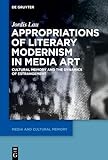Appropriations of Literary Modernism in Media Art : Cultural Memory and the Dynamics of Estrangement / Jordis Lau.
Material type: TextSeries: Media and Cultural Memory ; 33Publisher: Berlin ; Boston : De Gruyter, [2021]Copyright date: ©2022Description: 1 online resource (VIII, 239 p.)Content type:
TextSeries: Media and Cultural Memory ; 33Publisher: Berlin ; Boston : De Gruyter, [2021]Copyright date: ©2022Description: 1 online resource (VIII, 239 p.)Content type: - 9783110720884
- 9783110729986
- 9783110729900
- 709.0407 23
- NX456.5.N49 L38 2022
- NX456.5.N49 L38 2022
- online - DeGruyter
- Issued also in print.
| Item type | Current library | Call number | URL | Status | Notes | Barcode | |
|---|---|---|---|---|---|---|---|
 eBook
eBook
|
Biblioteca "Angelicum" Pont. Univ. S.Tommaso d'Aquino Nuvola online | online - DeGruyter (Browse shelf(Opens below)) | Online access | Not for loan (Accesso limitato) | Accesso per gli utenti autorizzati / Access for authorized users | (dgr)9783110729900 |
Diss. Universität Hamburg.
Frontmatter -- Acknowledgements -- Contents -- 1 Introduction -- 2 Appropriation, Estrangement, Memories: Theoretical Configurations -- 3 Actualizing Modernism: Case Studies -- 4 Conclusion -- Works Cited -- List of Figures -- Index
restricted access online access with authorization star
http://purl.org/coar/access_right/c_16ec
By analyzing appropriations of literary modernism in video, experimental film, and installation art, this study investigates works of media art as agents of cultural memory. While research recognizes film and literature as media of memory, it often overlooks media art. Adaptation studies, art history, and hermeneutics help understand ‘appropriation’ in art in terms of a dialog between an artwork, a text, and their contexts. The Russian Formalist notion of estrangement, together with new concepts from literary, film, and media studies, offers a new perspective on ‘appropriation’ that illuminates the sensuous dimension of cultural memory . Media artworks make memory palpable: they address the collective body memory of their viewers, prompting them to reflect on the past and embody new ways of remembering. Five contextual close-readings analyze artworks by Janis Crystal Lipzin, William Kentridge, Mark Aerial Waller, Paweł Wojtasik, and Tom Kalin. They appropriate modernist texts by Gertrude Stein, Italo Svevo, Louis-Ferdinand Céline, Guillaume Apollinaire, Virginia Woolf, and Robert Musil. This book will be of value to readers interested in cultural memory, sensory studies, literary modernism, adaptation studies, and art history.
Issued also in print.
Mode of access: Internet via World Wide Web.
In English.
Description based on online resource; title from PDF title page (publisher's Web site, viewed 25. Jun 2024)


